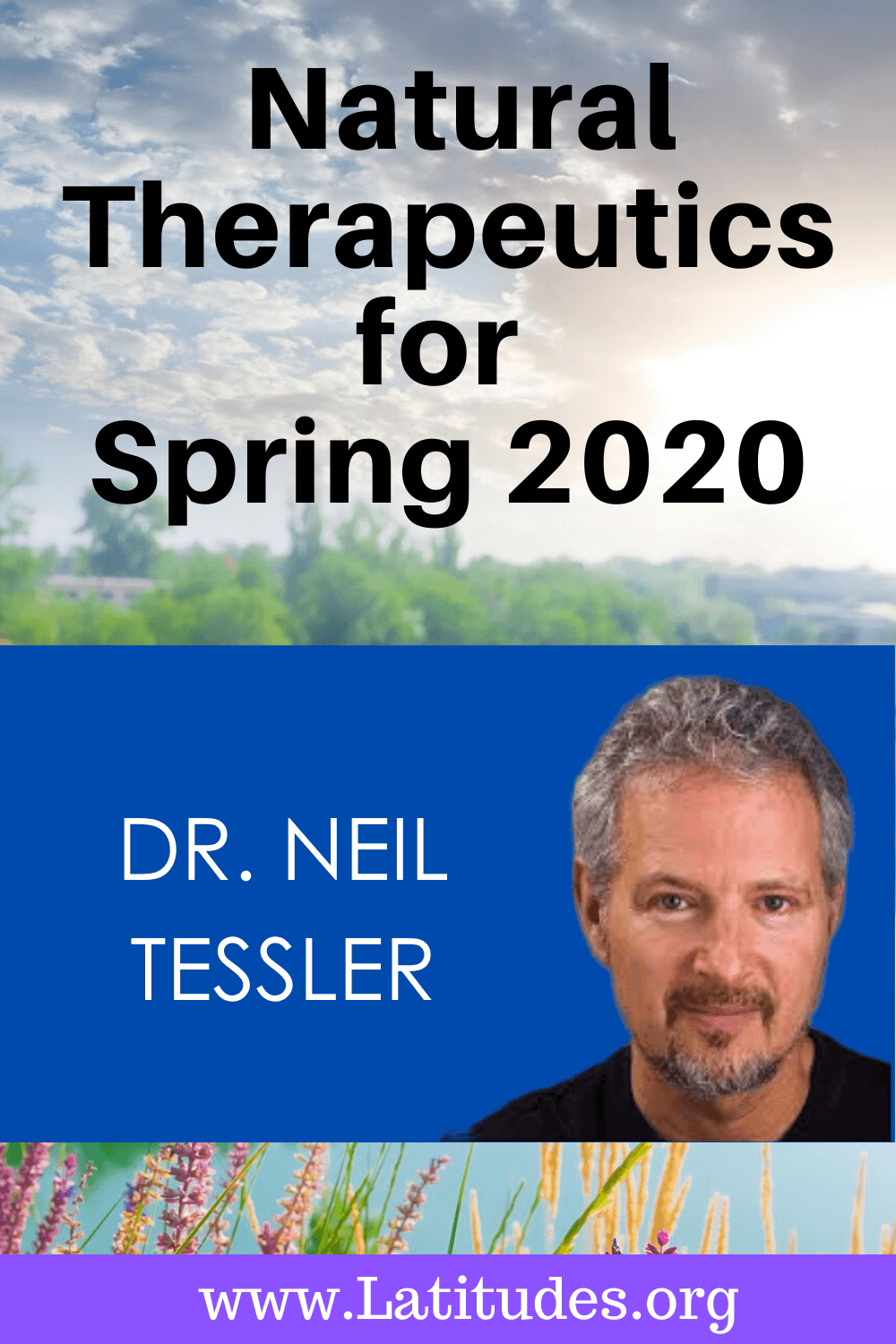Natural Therapeutics for Spring 2020
Neil Tessler, ND, DHANP
Dr. Neil Tessler is a naturopathic physician specializing in classical homeopathy. He is a long-standing Diplomate of the Homeopathic Academy of Naturopathic Physicians, served as president of the Academy for five years, and was editor of the Academy’s international journal for six years. An author, educator, and lecturer, Dr. Tessler is practicing in South Surrey, British Columbia.
Editor: This informative article began as a letter from Dr. Neil Tessler to his patients and friends. One of our advisory board members shared it with me, and I requested Dr. Tessler’s permission to publish it, with hopes that readers will find it helpful during this difficult time. It is not intended to be applicable to all readers, nor did the author intend it to be taken as specific medical advice.

DR. NEIL TESSLER
Dear Friends,
I wanted to share my findings after a period of research as well as a number of seminars with top practitioners. Firstly, though, as a disclaimer, it is necessary to say that my presentation here is for general informational purposes and is not meant to promote any preventive or curative measures for the Covid-19 virus. Naturopathic physicians in British Columbia have been designated an essential service and are following very closely the guidelines given out to health care practitioners by the Provincial Health Officer. I’ve left how my office is operating to the end of this paper.
Of course, I’m going to keep this as simple as can be. Much will be repetition from what you may have already learned. Some will be new. Along with all of the necessary personal and social behaviors being promoted by public health authorities, it is certainly worth considering some of the research that may have relevance to the current situation. I’ve also provided plentiful scientific references for those who would like to delve more deeply. This article focuses on naturopathic considerations. In the next article I’ll be discussing what’s been going on in the homeopathy world around Covid-19 and the homeopathic experience in past epidemics.
Just yesterday I learned that my nephew was ill with what has been confirmed to be Covid-19. He has a wife and three young boys, all so far well. Today I spoke with him and questioned him in detail regarding his experience, and believe me, none of us would want to go through it. I then spoke with his wife and reviewed all the measures she is employing to help herself and this was a great discussion. Notably, a number of his work colleagues are ill but have not been tested, which tells us that the true count is well ahead of what is reported.
This also illustrates in several ways the importance of social distancing. We don’t know who is infected until they have isolated long enough to pass through the incubation stage, which can go all the way to three weeks. People feeling fine could be vectors of infection, as could their co-workers or family, so we have to avoid a false sense of security. Control freaks are having a huge healing right now as they finally realize we don’t control much and finally let it go. Nevertheless, we can, with an effort of will, control our behavior.
A Few Points About Covid-19
This is a very infectious and virulent (which essentially means harmful) organism. So it is easily transmitted and easily able to do its dirty work. In the process of infection, once the virus attaches to a cell and then enters, it develops by activating a specific factor in the cellular fluid called an NLRP3 inflammasome. You don’t have to remember NLRP3. In fact, forget I even said it. The important point is that this inflammasome activates the release of a complex family of immune factors known as cytokines that are ultimately responsible for the illness caused by Covid-19.
By now you may have heard the term “cytokine storm”, which refers to an immune system gone wild. Cytokines are a normal part of the immune system, though under various circumstances they can trigger severe local inflammation, as in rheumatoid arthritis. A Cytokine Storm is when too many cytokines are released too quickly, leading to fever, inflammation, and the array of symptoms associated with the illness.
Of course, there are various other intriguing biochemical points around the coronavirus and its interactions in the cellular environment, but enough, as they say, is enough.
Risk Factors
The severity of the infection depends on two main factors. First is the basic health status of the individual. This includes any underlying conditions, the ways in which medications effect immune function, as well as nutritional status. Stress is another risk factor as it has so many harmful effects on the body, including increasing inflammation and depressing immune function. So chill out, get enough rest, breathe deeply, and learn to meditate, as now is surely the opportune time.
The second basic risk factor is age, as many of the most potent defensive and restorative systems within the body are less efficient with age. Age-related health issues such as cardiovascular or respiratory illness, and all of the other wide-ranging biological changes that go along with aging, can be a dangerous combination. I happen to be sensitive to this subject as I qualify for a pension this summer!
So in our review of research with some potential relevance, we have tried to understand how to support our bodies defensive capacity, increase the immune systems ability to kill viruses, prevent viruses from attaching to cells, prevent viral replication within the cell, or reduce the activation of inflammasomes and other cellular factors that lead to serious illness. One of the most interesting things I have learned though, is that virtually everything that has relevance to preventing viral infection, is also relevant to cancer prevention. I have nothing more to say about that here, but wanted to share that finding.
Again though, my initial disclaimer must of necessity be restated: I am not attempting to promote specific preventive or curative treatments for Covid-19, but rather to look at research that may or may not have some relevance.
Basic Nutritional Considerations

A clear conclusion from all of my research is that a plant-based natural food diet, rich in variety and color, is your first, most important line of defense.
Even the elements that give foods their color are potent, antioxidant. and anti-inflammatory nutrients. Some have been shown to reduce inflammasome signals that can lead to a cascade of inflammatory factors. So eat plenty of fresh vegetables, fruits, berries, nuts and seeds.
I would particularly mention broccoli sprouts due to their rich content of sulforaphanes, though broccoli, cauliflower, cabbage, and kale are all endowed with this molecule. The current novel coronavirus is activated by an enzyme called TMPRSS2. Sulforaphanes, besides dampening inflammation, directly inhibit this enzyme. Green tea catechins also inhibit the secretion of TMPRSS2.
Also legumes, i.e., beans, as well as grains such as millet, buckwheat, quinoa, and rice are all rich sources of macro and micro nutrients as well as a wide variety of phytochemicals, unique plant chemicals with health promoting and anti-aging value.
In fact, inadequate nutrient status is a major risk factor, so it doesn’t hurt to take a high quality multi-vitamin/multi mineral supplement. There are various micronutrients that help maintain strong immune function, such as zinc and selenium. Diet alone can be insufficient and a general supplement can ensure that you’re covered. I would not recommend garden variety drug store formulas such as Centrum, as the quality of the nutrients and secondary ingredients are much less in tune with our natural physiology. Better to consider natural food stores or natural health professionals. The typical natural food store customer is a label reader and a student of quality in this regard, therefore the companies are more competitive and produce better products to impress the market. This is useful because the form of a nutrient that you take can make a big difference in assimilation and utilization.
Gargling
I was sent an audio by six people on the same day of a woman with an Aussie accent claiming to be giving advice from a Spanish doctor. It wasn’t all that credible to me but she spoke about gargling, so I did a little research on this. Lo and behold, I discovered that gargling with green tea or salt water can be a very useful factor in lowering the risk of viral infection. Drinking green tea also has important benefits due to the potent green tea catechins.
Supporting Your Health with Natural Products
Please note that these suggestions are provided with the understanding that individual needs may vary; no protocol can apply to everyone. Also, breastfeeding mothers should consult with a knowledgeable practitioner for supplementation.
Vitamin C – 1-2 grams three times daily with meals. For kids above three years of age, 200 mg. is plenty for kids and that is well more than would normally be needed. Vitamin C inhibits inflammasome activation and improves the outcome of upper respiratory infections. For a variety of reasons, metabolic requirements go up significantly with infection, so double or even triple your dose if you become ill. Some hospitals are using IV infusions.
Vitamin D – 5000 IU daily with meals. For children aged one and above, 400 to 1000 is adequate, the higher range being appropriate to regions with less sun. This is a preventive factor as the influence of vitamin D on the immune system is significant. Vitamin D supplementation is important generally as vitamin D deficiency is quite common in northern climates.
Zinc – 20 to 25 mg daily for adults. Children from infancy to three years 3 – 5 mg; for growing children around 10 mg. is adequate through to the late teens. Zinc is one of our top anti-viral and immune support nutrients. It improves the function of white blood cells, an essential aspect of our immune defense and prevents the entry of viruses into cells. It can also prevent excess cytokine production.
N-acetyl Cysteine – 500 mg twice daily. This nutrient increases levels of glutathione, the body’s master antioxidant. It protects the energy engine of the cell, as well as various organ systems. It improves mucous clearance in the lungs, improves lung function, and helps protect against lung damage. It also disrupts bacterial communities called biofilms.
Quercetin – Quercetin is a flavonoid found in fruits and vegetables, and is particularly rich in apples and onions, particularly onion skin. Onion skins are used as a dye and the pigment itself is the quercetin. Simply pour boiling water over onion skins and allow it to sit for thirty minutes, strain then drink it. Add a little miso and voila! I’m not saying you should do this, I’m saying you could do this but, to make a long story short, if its not organic, don’t bother! Absorption of quercetin from onions is twice that of tea and three times that of apples. Quercetin has wide ranging values but relevant to our current situation, it inhibits the ability of viruses to establish an infection through several mechanisms including preventing their entry into cells and reducing replication of the viruses that do enter. To achieve benefits, supplemental doses of about 500 mg twice daily with meals are required.
Melatonin – Melatonin is not just for sleep. No, no, no! Yes, it can give you wild dreams. Yes, yes, yes! Melatonin is a potent inhibitor of NLPR3 (oops!) inflammasones, helps maintain the balance of the cell’s energy engine, the mitochondria, is antioxidant, and lowers the production of pro-inflammatory cytokines. Melatonin can also prevent lung injury that can be associated with mechanical ventilators. Melatonin levels fall very significantly with age. A child can have ten times the level of melatonin as a healthy adult senior. Is there a relationship between melatonin levels and the far greater impact of the coronavirus on seniors? An interesting question. Even a half to one mg taken in the evening can be a valuable supplement, particularly for seniors.
Herbal Medicine
When I was a teenager, I couldn’t get that excited about herbal medicine as the information around any given herb seemed so general and imprecise. In the many years since, herbal medicine has gained a far greater foothold in research. So much so that there is a huge and ever expanding world of information on the chemistry and bioactivity of a vast array of medicinal herbs. So as not to drag this already long article too much further, I’m going to simply list some of the most significant herbs with relevance to the inflammatory pathways associated with coronavirus, general immune system benefits and antiviral activity. Formulations based on some or all of these plants may be useful considerations at this time.
Astragalus – Anti-viral, anti-inflammatory
Andrographis – A very potent broad spectrum anti-viral. Rather exceptionally bitter.
Licorice – Anti-viral, anti-stress, improves absorption of nutrients. Caution: Dose matters as it can stimulate high blood pressure.
Holy Basil – Anti-stress, broad spectrum anti-bacterial, anti-viral, anti-fungal
Mentha – Anti-viral, anti-inflammatory
Medicinal Mushrooms (Reishi, Maitake, Shiitake, Turkey Tail, Cordyceps) – Excellent immune support and anti-viral.
Olive Leaf – Anti-viral, anti-inflammatory, protects the entire cardiovascular system
Scutellaria baicalensis – Potent anti-inflammatory and viral inhibition
Nettle – Reduces cytokine release and reduces a range of associated inflammatory factors
Elecampagne – Prevention and support for lung inflammation
Elderberry extract – Despite the controversy, experts agree that Elderberry, at least up to the point of symptoms, has many potential benefits and should not be ignored. A fairly potent anti-viral herb that also tastes great.
Clinic Information
During the Covid-19 crisis our office is happy to continue offering appointments via Skype, Face Time, Facebook Messenger video, What’s App or phone. To my experience, online video is as good as in person for first time case-taking and follow-up. Details for appointments are found on the online appointment system at my website or by phoning the office. Suitable arrangements will be made for safe pick up or shipping via courier or Canada Post of homeopathic remedies and natural products.
Last Word
At this remarkable juncture through which we are all passing I ask myself: What will the world be like afterwards, when billions of people have shared such a dramatic, life-changing experience – even if they are not impacted personally, but the physical distancing, the time away from work? What will change in our values and priorities and what will remain? If we can appreciate that we are in some kind of world-altering gestation, do we want that to be based on fear or do we want that to be based on love?
Now is an opportunity if you don’t have kids swirling around you, to journal, to learn to meditate. You may wish to check out my free meditation program on the website. You may also consider reviewing the Regenerative Nutrition series of videos. It’s long, but I suspect you’ll have lots of time. All found under the education category.
May you and your dear ones be safe through this difficult passage.
Dr. Neil Tessler, Surrey, BC (604)542-9759; uniqueholisticsolutions.com
References
Click to view the references for this article










Thanks for sharing this excellent list options for overall wellness! This spring is obviously like none other we’ve ever experienced. I thought I was maintaining a healthy diet, but this gave me new ideas I had never considered. I have been avoiding caffeine, since I’m nursing, but I am inspired to gargle green tea! Confession – as soon as I read this, I boiled some organic onion skins after making dinner and drank the “tea” after it cooled a bit. It was bitter, but somewhat comforting, too. I like the holistic approach of considering stress and meditation as well. Very thoughtful and something that seems relevant for anyone wanting to boost their wellness.
Hi Sharon – Firstly, thank you to Latitudes for sharing the article with your readers and thank you Sharon for your comments. The issue of nutrition and supplements comes down to our systems susceptibility to illness.
The better our nutritional status and overall health balance, the less likely our system will succumb to infection. Why do many people have a very mild reaction or even none to this virus while for others (like my nephew) it can be a very severe flu or for others (like my girlfriend’s aunt’s brother), deadly? The virus isn’t different, rather what is different is the nutritional status (for instance deficiency in Vitamin A, D, Selenium, Zinc), hormonal status (low DHEA in middle age or older people affects immune competence), stress level, and the overall or underlying health of the individual.
So nutrition and supplements, along with keeping fear and worry at bay, represent an important aspect of our frontline defence. Along with this there are herbs that can make as more resilient to stress, tamp down on inflammation and make it harder for viruses to thrive.
Dr. Tessler, thank you for taking the time to respond. I’m sorry that COVID-19 has hit so close to home for you and your loved ones. It’s empowering to think we can make a difference by boosting our systems with nutrients and herbs (along with taking care of our mental well-being) to better fight off this insidious virus. I hope your message reaches more and more people and that it brings them positive health results!
Also, are there any herbs or supplements you’d suggest avoiding from your article if breastfeeding? Thank you!!
Hi Sharon – Very sorry for the long delay in replying, as I just saw this now. There should be no concern with regard to either the supplements or herbs and breastfeeding. The only precautions may be my suggestion of mint, which can dry up breast milk and alterations to the taste of the milk from some other the herbs.
This was really helpful! Lots of new ideas to focus on–it feels good to have concrete steps I can take. THANK YOU!!
I found this article to be so informative and helpful . You shared tools and tips that can be implemented to improve the health of our bodies and boost our immune systems. It was expressed so eloquently and I found it to be extremely valuable in these very challenging times. I am very grateful to you for sharing this and for Latitudes for positing this piece to educate their readers. Looking forward to better and healthier days ahead. Thank you, Dr. Tessler.
Hi Dr Tessler, I take melatonin every night but didn’t realize it could help beyond sleeping. That was encouraging, at least I feel like I’m doing something right. I live in the states and wonder if you recommend a source for ordering herbs. A lot seem to come from China and I don’t know if that is safe? Thank you, hope you have time to answer.
Hi Shelby – Herb Pharm in Oregon is a very reputable source (https://www.herb-pharm.com/) as is Gaia herbs (https://www.gaiaherbs.com/) . I generally use tinctures, which are liquid concentrates of the herbs, though I purchase all of mine here in Canada. I do my own custom blends for my patients. You will likely find that many of the suppliers have shortages due to the tremendous demand for some of the herbs I’ve described.
This scientific references (https://www.ncbi.nlm.nih.gov/pmc/articles/PMC5405617/)on Melatonin lists the following benefits: “The physiological effects of melatonin are various and include detoxification of free radicals and antioxidant actions, bone formation and protection, reproduction, and cardiovascular, immune or body mass regulation. Also, protective and therapeutic effects of melatonin are reported, especially with regard to brain or gastrointestinal protection, psychiatric disorders, cardiovascular diseases and oncostatic effects.”
Here is a Chinese scientific reference that specifically talks about Melatonin as an “adjuvant” treatment for Coronavirus. (“An adjuvant is a pharmacological or immunological agent that modifies the effect of other agents.”) https://www.ncbi.nlm.nih.gov/pmc/articles/PMC7102583/
Thanks for the helpful article and tips. I had no idea that melatonin had other health benefits beyond using it as a sleep aid. What are your thoughts on the use of beta carotene as an immune booster?
While B-carotene is a potent antioxidant and while it may have some utility in the present situation, it is only one of a class of plant factors called carotenoids that are, generally speaking, more effective when taken together. Overall, carotenoids are rich in a plant-based diet and that is the best way and the safest way to bring them into your body. There is a forms of B-carotene that is artificial and not as well metabolized and has even been shown to have contrary effect so may not even be all that safe as compared to natural B-carotene. So that’s another important distinction. I think my article identifies the major helpful factors and that begins with a truly health supporting diet and builds out from there.
OK. Thanks for the helpful reply. I’m looking forward to reading your next article on homeopathic medicine.